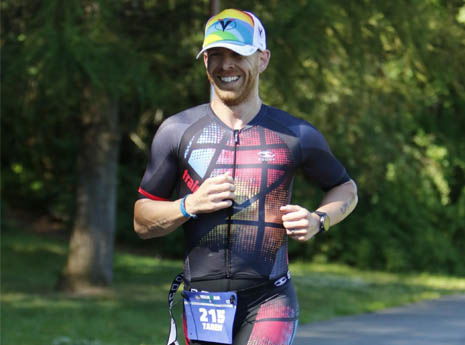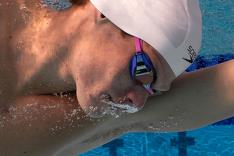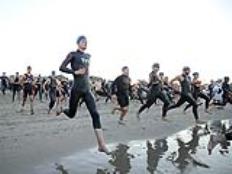Nearly every new triathlete who doesn't have a swim background ends up with an unwanted pedicure, thanks to their toes dragging on the bottom of the pool, caused by sinking legs. All jokes aside, this is a serious issue because it can cause a sense of panic. That panic makes a person feel out of breath, which then causes the body to flail, resulting in much slower and less enjoyable swimming.
Even if you don't come from a swim background, or if you've got really muscular legs and fear they'll always sink, I guarantee you can get those guys to float with the right approach. Here are the steps to fix sinking legs in the swim, taken from our book, Triathlon Swimming Foundations.
Step No. 1: Develop Comfort in the Water
When you first take up triathlon, you'll need to retrain yourself to breathe in the water. Go into the shallow end of a pool and, with your hands on the edge of the pool, stick your face in the water and forcefully breathe out. Once you can do this and still feel calm, go into the deep end and tread water. Then, perform a "sink down" by stopping treading and breathing out air forcefully; you'll sink down in the water. The key is to do this over and over, calmly, to develop comfort breathing in the water.
Step No. 2: Learn How to Float Like a Log
Once you can breathe comfortably in the water, you can move on to learning how to keep your bottom and heels at the surface of the water.
Go back into the shallow end of the pool and place your hands on the edge of the pool. Lift your feet off the floor and kick only as hard as you need to in order to keep your bottom and heels at the surface. Using a snorkel for this drill will help you stay calm, but like anything, using a snorkel will take about 10 sessions to get used to, so be patient.
Once you've got this drill perfected, progress to the next step by taking one hand off the edge of the pool and kicking while turned 45 degrees on to your side. Make sure you're still keeping your bottom and heels at the surface.
Step No. 3: Learn to Swim Straight Like an Arrow
Once you have the above drills nailed down, while still in the shallow end, push away from the wall and try to kick across the pool; first do this with your face straight down into the water, then on the way back, kick back to your starting spot while turned 45 degrees on your side.
When you first start to do this drill, instead of trying to take breaths during the drill, stand up and reset to gather a calm mind, then restart. Eventually you'll be able to kick across the pool with your face in the water, and your butt and heels at the surface of the water while turning 45 degrees on your side to catch small breaths; you'll be calm as you float across the surface of the water without sinking legs.
These drills may take several weeks to nail down perfectly, but that time spent focusing on these drills will reap huge benefits once you no longer feel panicked or out of breath. Soon enough, you'll be swimming easily and enjoying it.
READ THIS NEXT: 7 Mistakes Beginner Triathletes Make When Swimming
About the Author

Taren Gesell was a leading global voice in triathlon, publishing the Triathlon Foundations book series and hosting the world’s largest triathlon podcast. He is a former world-ranked triathlete, record-setting marathon swimmer, and founder of the voice-AI training app MOTTIV.








Discuss This Article